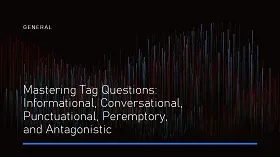Understanding Question Tags: Types, Uses, and Examples
Question tags are a fascinating aspect of English grammar, often used to seek confirmation, emphasise a point, or engage the listener. This section explores the different types of question tags, their uses, and their nuances in English.
Informational Question Tags
Informational question tags are used to elicit a response from the listener. They can serve as polite requests or seek specific information. Here are some examples:
✧ You wouldn’t be a dear and collect it on the way back, would you? (1975 Price 123)
✧ You know my daughter Elizabeth, I think, don’t you? (1974 Snow 17)
These tags are designed to engage the listener actively, often in a conversational or polite manner.
Conversational Question Tags
Conversational question tags are used to include the listener in the discourse, creating a sense of shared understanding or agreement.
✧ Bit of trouble, back there on the Pentonville Road, wasn’t there? (1987 Bawden 174)
These tags are common in everyday speech and help maintain the flow of conversation.
Punctuational Question Tags
Punctuational question tags are often used in soliloquies or monologues where no response is expected. They serve to emphasise a point rather than invite interaction.
✧ My son didn’t tell me – I found out about his fare fiddling through a court letter... No job and this won’t help. So what now? I don’t know, things have changed, haven’t they? (1989 Aug. 29 poster on London tube train)
✧ We’re all terribly keen, aren’t we, on ethnic cultures? (1989 July 21 Punch 6/3)
✧ I don’t want wet and mud all over my shop, do I now? (1974 Potter 94)
✧ Because you say no to everything, don’t you? (1988 Mortimer 182)
✧ You can be a prat, can’t you? (1989 Jan. 28 ch. 9 San Francisco Mystery: Inspector Morse)
✧ Why should you? They don’t tell even you everything, do they? (1992 Dexter 66)
These tags are more about emphasis than seeking a response, often appearing in the middle of sentences.
Peremptory Question Tags
Peremptory question tags are used to close off discussion, often discouraging further interaction. They can range from mildly dismissive to outright abrasive.
✧ We’ll know at the end, won’t we? (Gentle peremptory tag)
✧ We’ll know when it gets here, won’t we? (Aggressive peremptory tag)
✧ It has to boil, doesn’t it? (1986 Oct. Peter Barnes’s adaptation of G. Feydeau’s Scenes from a Marriage, Barbican Theatre)
✧ I’ll have a chance to say what I think then, won’t I? You’ll have to wait. (1987 Mar. 11 Evening Standard 6/3)
✧ Well we couldn’t know that, could we? (1986 fall telephone conversation with a Post Office official, London)
✧ Well, we don’t know, do we? That’s what we’re waitin’ to find out. (1987 Feb. 2 ITV Coronation Street)
✧ Well, if you look through these now, you’ll get an idea, won’t you? (1987 Feb. 3 BBC1 EastEnders)
✧ I work here, don’t I? (1987 Mar. 17 BBC1 EastEnders)
✧ They demolished our street, so we had to move, didn’t we? (1987 Mar. 23 ITV Coronation Street)
These tags are often used to assert obvious truths, leaving no room for debate or further questions.
Antagonistic Question Tags
Antagonistic question tags are the most confrontational, often implying that the listener should already know the answer. They are typically used in hostile or aggressive contexts.
✧ I’ve got a headache, haven’t I? (Millar and Brown 1979, 35)
✧ I didn’t bloody see her, did I? (1981 Dexter 158)
✧ We took that from the Boers, who fought us in South Africa, didn’t we? (1985 Price 38)
✧ I talked to him all right. There was just one problem. He wasn’t bloody listening, was he? (1986 Dec. 20 BBC1 Bergerac)
✧ I went the other way, didn’t I? (1987 Hart 101)
✧ Oh, you stupid woman – it’s his child, isn’t it. (1987 Apr. 1 ITV Coronation Street)
✧ Well, I couldn’t see that, could I? It was much too dark. (1988 Mortimer 173)
✧ No. Threw it away, didn’t I? (1994 Dexter 262)
✧ He gave me aggravation, didn’t he? (2003 James 241)
These tags are designed to reprimand or belittle the listener, often creating a tense or uncomfortable atmosphere.
Final Thoughts
Question tags are a versatile tool in English, serving various functions from polite engagement to outright confrontation. Understanding their nuances can greatly enhance your communication skills, especially in British English contexts.








